LXP (Learning Experience Platform) is often AI-driven SaaS-based web or mobile learning management system with a monthly subscription if you purchase a ready-to-use elearning solution. The primary goal of an LXP platform is continuous learning for creating internal mobility, addressing talent gaps, and growing highly performing professionals. If your company uses LMS for corporate education, shall you switch to LXP or just add advanced features to your LMS? Or if it’s your first time to choose an eLearning platform, what to choose to make the best investment decision?
Based on 15+ years of expertise in eLearning software development, we will analyze your business needs in-depth and recommend the system that will resolve all the challenges your company faces, whether it is LMS development, LXP development or even skills management software implementation.
Get a free quote!
What is LXP?
LXP stands for Learning Experience Platform.
As software for professional learning, LXP is a solution to the problem of the up-to-date content shortage typical for an LMS.
There are a lot of high-quality learning libraries with content that is automatically updating. It's more cost-efficient just to integrate your e-learning platform with this ready-to-use content than to deal with old content that you need to import manually into your LMS. With LXP functionality both options are possible: you can import some courses manually, as well as integrate with courses providers via API.
LXP provides high engagement. Compared with a strict predefined learning path in LMS, LXP's learners build their own path that gives them more control and more productivity, both in acquiring new skills and in upgrading their qualifications.
Artificial Intelligence behind LXP accelerates the adoption of new knowledge. AI-driven algorithms recommend to the learner personally structured content that is exactly what the learner needs exactly at this time. Neither more nor less.
Some experts compare LXP with Netflix in eLearning due to its consumer-oriented methodology and intelligent content recommendation. Here is how its interface usually looks like (example of Linkedin LXP).
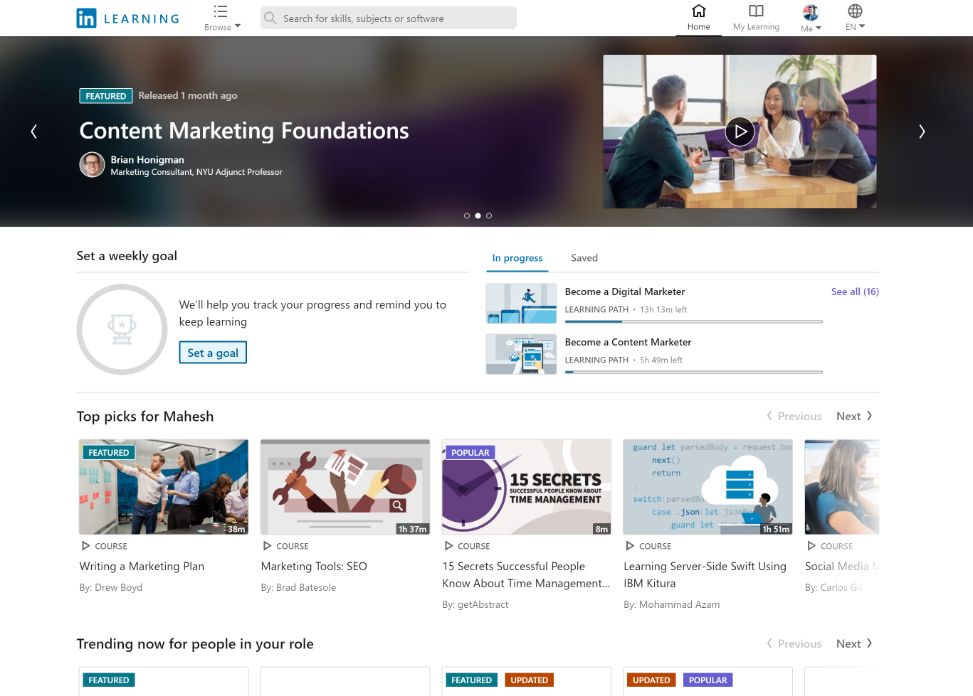 linkedin.com
linkedin.com
LMS vs LXP: Key Differences
| LMS development | LXP development |
| Learner’s course is predefined and scheduled. | Learners choose content based on recommendations and their own interests. |
| Learners follow predefined curricula. The learning path is laid out before them and they just need to complete each milestone to get to the finish. | Learning paths are self-directed and built when learners pick what they want to learn about. |
| Focus on corporate learning for onboarding, compliance training, and licensing. Perfect fit for mandatory training when learners must complete specific, predetermined steps. | Focus on user experience and continuous professional development with company purpose to grow highly performing professionals. |
| Administrator-centric system when an admin (HR, leadership member, trainer) creates and delivers formal training to workforces. | Learner-centric system when learners choose content based on their interests. |
| Based on an internal company course catalog. | Based on materials from internal knowledge base, external resources, and user-generated content. |
The line between those two classes of software is blurry and will depend on the functionality of a given system.
For example, many LMS’, including Docebo and D2L, have addons that let the system perform as an LXP. Any educational software that supports the LTI standard can stream third-party learning content. On the other hand, features like learning paths and social integration are pretty much industry standard for an LMS.
So companies may have an LXP, an LMS, or both depending on their goals and employees’ training approach.
Use the LXP and LMS in tandem to:
- launch and track LMS-created course in LXP;
- augment your LMS-based training with a vast content library that LXP provides;
- allow admins to easily manage all corporate learning processes;
- get all analytical data from different platforms in one place.
Have an LMS and cannot decide if you need to switch to LXP or just add more functionality to upgrade your LMS to get all innovative features? Contact our eLearning expert to get professional advice based on your situation.
How LXP resolves business challenges
Learning Experience Platforms appeared as a response to new business challenges that stakeholders faced and couldn’t resolve without an innovative approach.
Among the major business challenges that companies face now there are:
- the need for continuous upskilling and reskilling of the workforce;
- preventing talent shortage;
- organizing internal mobility;
- timely building of employees’ in-demand and future-proof skills;
- leadership retiring and preparation of the next generation;
- avoiding employees’ burnout and increasing engagement.
To address the mentioned business challenges, the learning content within the LXP must be highly relevant and just-in-time, which is achieved through highly personalized recommendations.
Personalized recommendations allow learners to choose the learning path that will mostly favor their skill-building and keep up their engagement rates.
Let’s turn to Josh Bersin, the expert researcher in the topics of corporate HR, talent management, and technology. He suggests that LXPs recommend content based on the following approaches:
1. Skills-based recommendations.
An LXP associates a job position with a certain skill set. So creating a profile in an LXP requires mentioning your actual skills.
When employees decide to upskill or reskill they choose the desired position. The LXP detects the skills they are supposed to possess.
Then the system matches these skills with the available content.
The content for learning will be recommended based on the gap between the actual skills and the skills required for the desired job position.
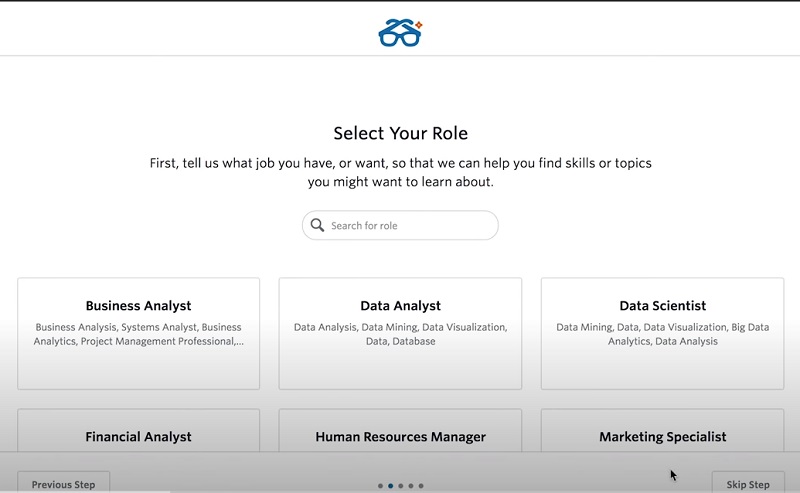
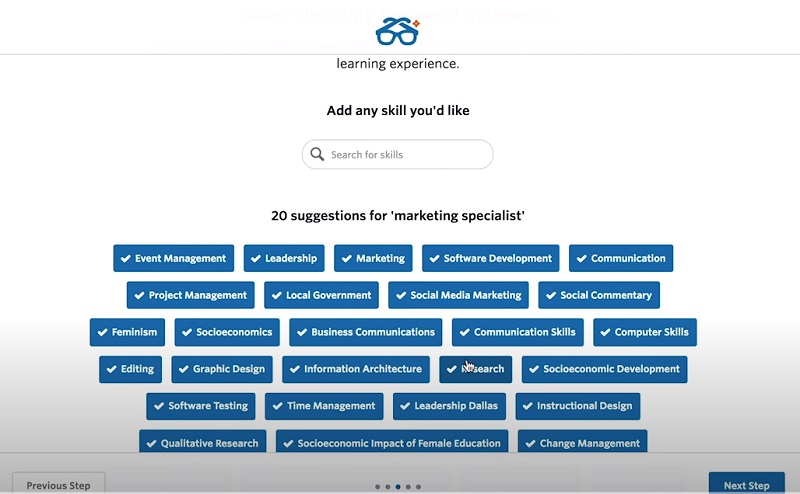 degreed.com
degreed.com
2. AI-based recommendations.
An AI engine collects data about learners, their performance, behavior, and learning paths.
Imagine you give an AI engine 1000 learners’ profiles. AI labels all the data from the profiles (skills, expertise) and the requested content (course categories, difficulty level).
Then the engine finds patterns that allow making automatic predictions about the interest of learners and the content relevance.
Essentially, the underlying task of Artificial Intelligence is to predict the engagement of learners, given contextual information about the learners and courses.
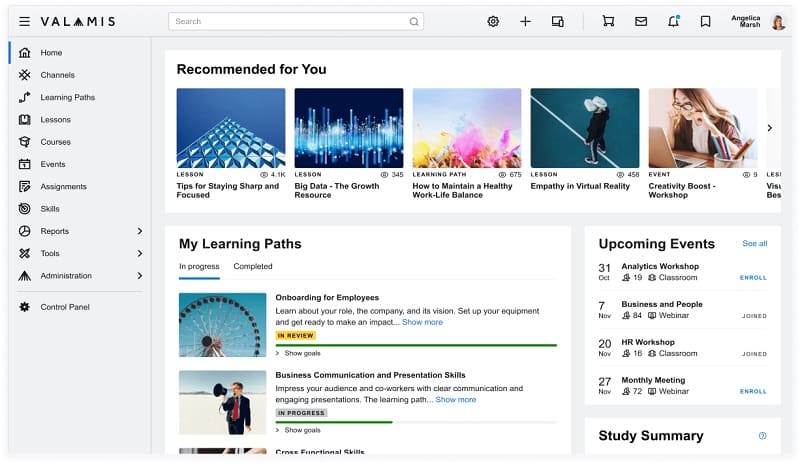 valamis.com
valamis.com
3. Usage data-based recommendations.
The LXP aggregates massive amounts of the data of other learners with similar profile information to use as a basis for your content recommendations.
Such an approach has its bottleneck. If some course is widely recommended, it outcompetes other content that could be more relevant and valuable. And the LXP developers are working to resolve the issue.
Some LXPs also let learners segment into communities. Thanks to this, the platform can recommend the most relevant and popular content within the community.
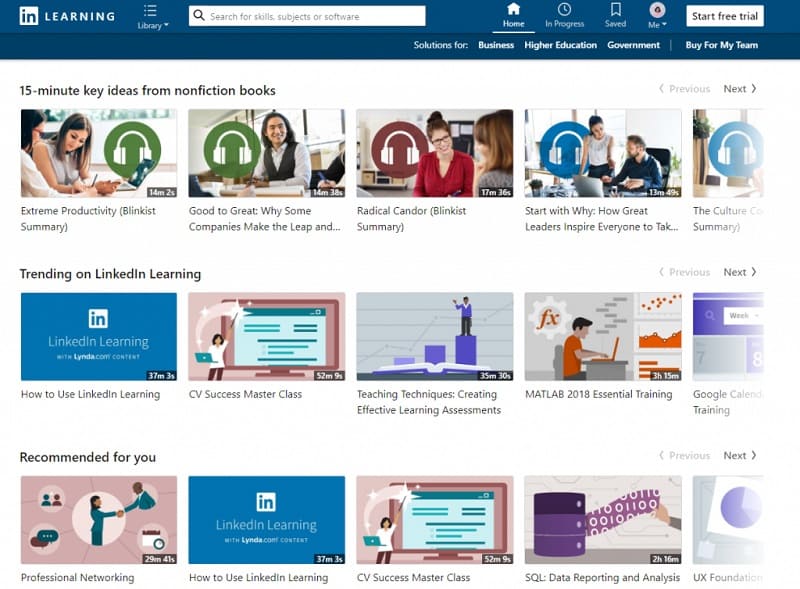 linkedin.com
linkedin.com
4. Recommendations based on learner’s personal choice.
To find out what content to recommend you can directly ask the learner.
This experience is similar to the first launch of Spotify when you need to choose your preferences.
In the case of LXPs, thanks to defining your interests and goals, the system gets relevant information about your learning preferences.
Except for the content recommendation directly, this approach can be used for the best learning process adjustment. So the system may ask you about your level of expertise and your preferable way of learning (e.g., through articles, podcasts, or videos).
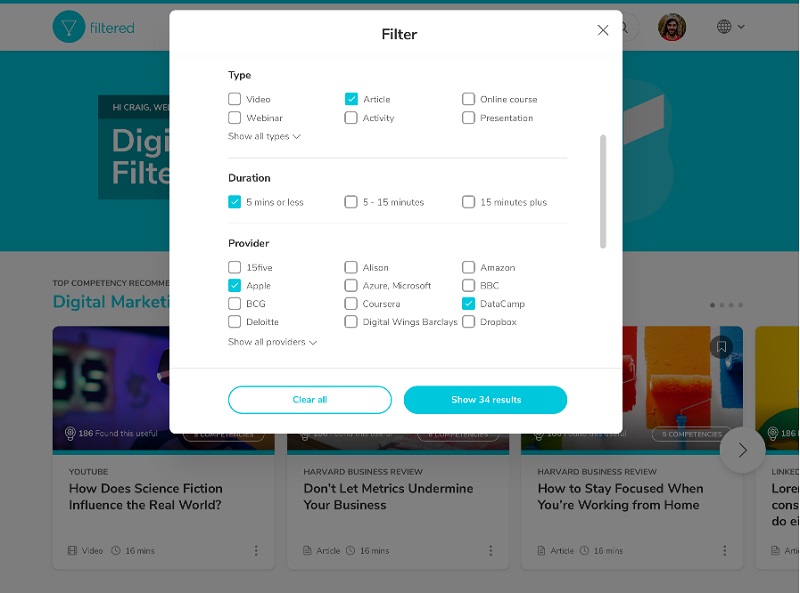 learn.filtered.com
learn.filtered.com
Have you thought about deploying one of these innovative content recommendation approaches into your corporate training? Discuss all the options with our eLearning expert.
Key LXP features
The first step to deploying an LXP in your company is to understand what your employees expect from the program. Based on this information, you can decide what LXP functionality would be the best fit.
However, there are the key LXP features every solid platform must have.
Highly intuitive individualized interface
The interfaces of LXPs are much like Netflix and Google have. They reveal past interactions, learning paths, preferences, and recommendations. The user interface is responsive, individualized, and ubiquitous in delivery. It provides highly immersive learning experiences to users of the platform.
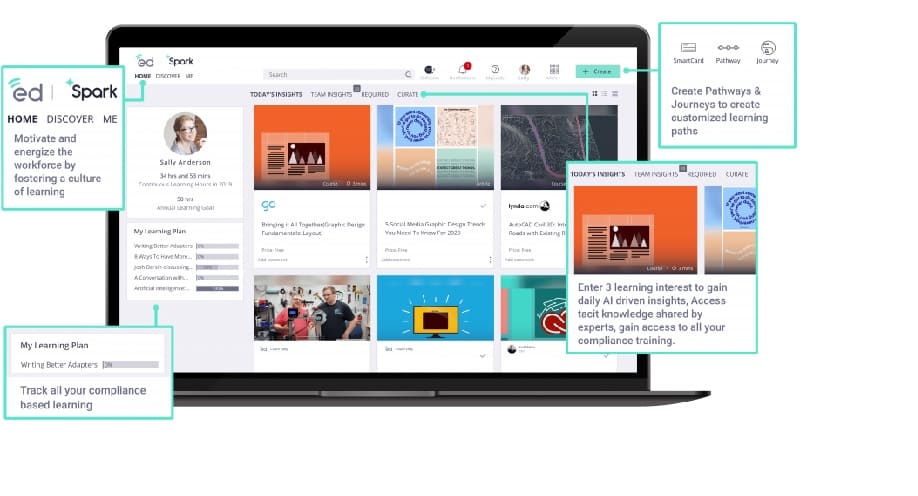 edcast.com
edcast.com
Social learning
This includes inbuilt functionality for communication and knowledge exchange (e.g. community-recommended or user-generated content);
Many learning experience platforms have rating systems, public comments, and sharing options like in social media networks.
Moreover, learners can showcase their expertise in the topic to their peers.
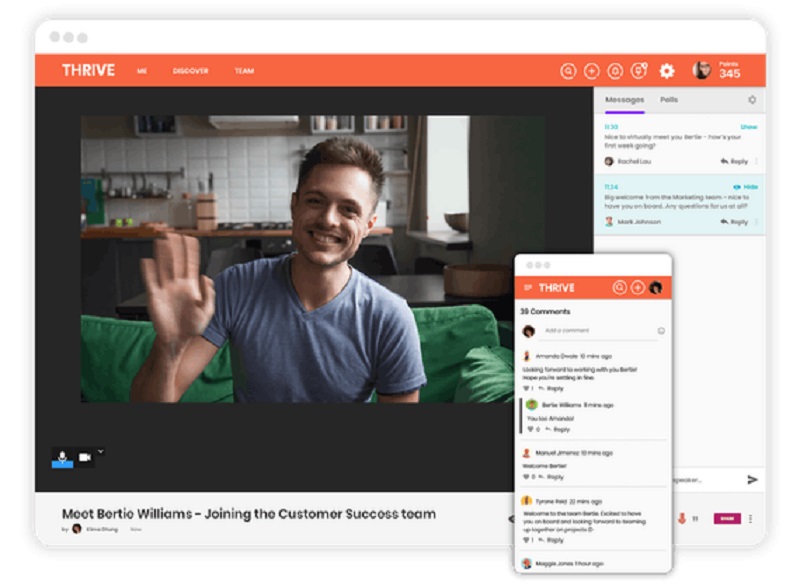 thrivelearning.com
thrivelearning.com
Microlearning
LXPs include brief learning pieces that answer topic questions precisely (e.g. “How to create a diagram in Google Doc”).
Such bite-sized learning allows employees to learn within the working environment, easily switching to the LXP on the desktop or a mobile device.
The microlearning method supports different types of learning, including blended learning, group-based learning, problem-based learning, ILT.
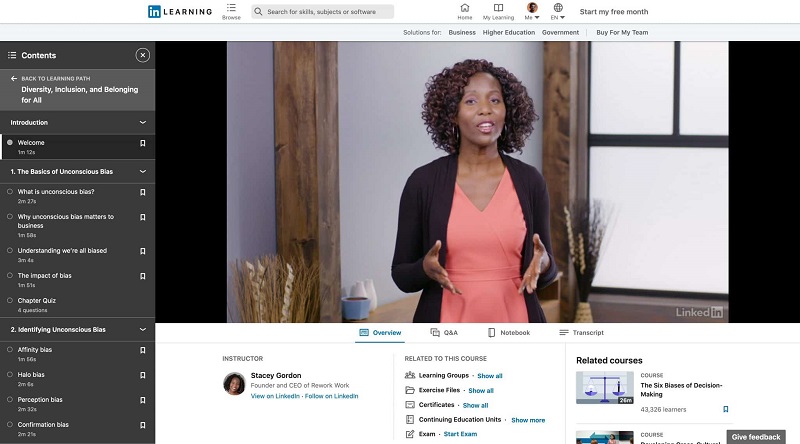 linkedin.com
linkedin.com
Gamification in LXP
Gamification is using game-design elements in a non-game environment. For example, a system of points, levels, and badges awarded for diligent study and high test grades is gamification.
Gamification is used much more often, as it requires less investment to implement. Yet it has proven its effectiveness. Here’s what it brings:
- Better learning outcomes. Studies show that gamified software is more effective at teaching than its non-gamified counterparts.
- Improved motivation. Game elements make people willingly spend more time studying, thus increasing the overall effectiveness of learning.
- Fun. People who participate in gamified learning as part of their work report increased enjoyment and loyalty towards their company.
For more information on gamification, its benefits, and risks see our article. And for examples of this approach in corporate training, read another one.
Don’t confuse gamification with game-based learning.
Game-based learning, on the other hand, is using play to teach skills or transfer knowledge. Solving equations quickly to make your racecar run faster than the opponents is an example of game-based learning.
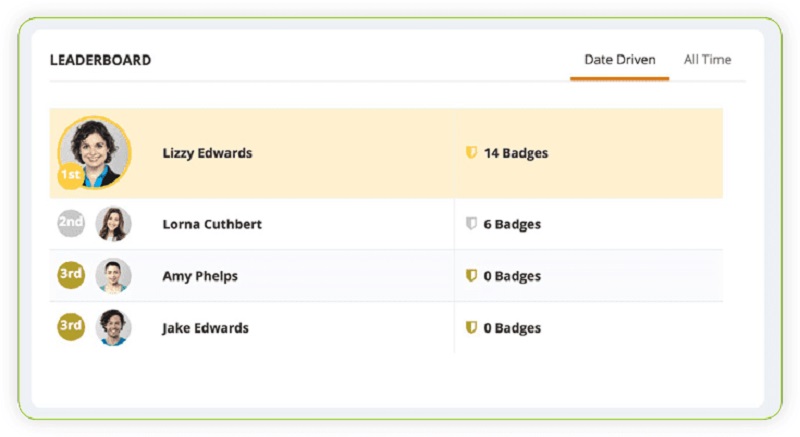
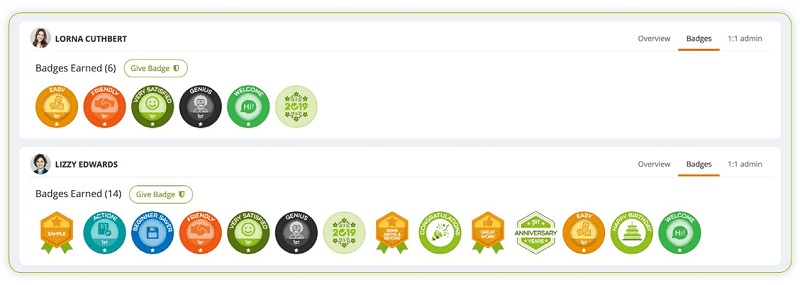 servicetick.com
servicetick.com
Extensive integration capabilities
Being a learning gateway, an LXP is usually just a part of a corporate L&D and HR system. It integrates with many other types of business software, including CRM, HRM, ERP, LRS, etc.
It permits the platform to collect the data it needs to curate content more effectively and to get valuable data for improving employee management.
For example, an LXP integrates with an LRS to deliver trends and patterns through data analytics. The purpose is to help in personalizing learning even further.
In-Built Artificial Intelligence
A key feature of the LXP is the Artificial Intelligence engine for content recommendation and personalization of a learning path.
The platform automatically recommends relevant learning materials based on a learner’s job position, experience level, previously completed courses, and other relevant information.
The use of AI includes the recommendation of lessons from third parties and “non-learning” systems such as YouTube.
Artificial Intelligence also performs a prediction function.
Thanks to the integration with HR, LRS, CRM platforms, AI collects data and identifies trends and patterns in the on-demand skills and jobs
So based on these data, business stakeholders can make informed training and learning decisions.
Advanced analytics with xAPI (SCORM, cmi5, LTI)
One of the primary goals of an LXP as a basis of a corporate learning culture is to connect learning with on-the-job performance.
To perform it successfully, LXPs have adopted advanced standards, such as experience API (xAPI), cmi5, LTI, or SCORM (as the one of the previous generation but still highly in use).
For example, it allows tracking how learners succeed in the course, what certificates they get, what skills they master, which courses are the most relevant and effective, etc.
All this information helps business stakeholders understand how the learning process influences the work that people perform and whether your training is truly effective.
Seamless access to multiple devices
It’s critical to give learners the ability to access content anytime and anywhere so that they could start a desktop course and be able to complete it later on a mobile device.
For that, your content must be available on any device, including desktop, native mobile, and progressive web apps.
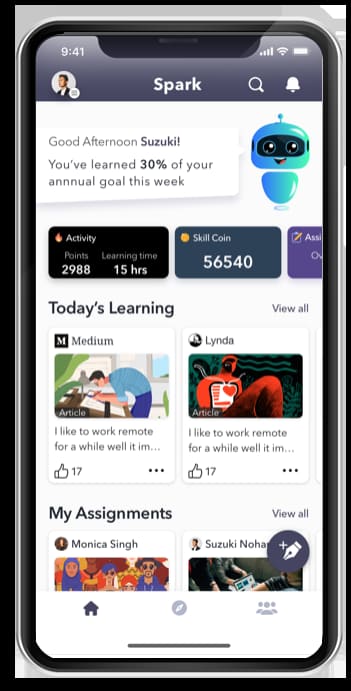 edcast.com
edcast.com
How Belitsoft Can Help
Being in the eLearning market for more than 15 years and having delivered several LXPs, we know what we are talking about. Here’s how we can help you:
- Custom LXP development. If none of the boxed solutions fit your needs we can make you a new one from scratch.
- LXP customization. If you need to make a few tweaks to an existing open-source system (whether it is changing a logo and a color scheme or adding new features and modules) we can do that.
- LXP consulting. We can discuss your needs in depth and recommend the system that would be the most beneficial for your company.
- Content development. Should also need to create lessons and quizzes or repackage the existing ones in a different format, we can do it for you.
Frequently Asked Questions
- Business purposes. LMS learning focuses on onboarding, compliance training, and licensing, while LXP is aimed at continuous professional development to grow highly performing professionals.
- Who manages the content and the learning process. LMS is an administrator-centric system when an admin creates a learning path, manages the content, assigns tasks, etc. LXP, on the contrary, is a learner-centric system when learners choose content based on recommendations and their own interests, and can self-direct their learning paths.
Rate this article
Recommended posts
Portfolio
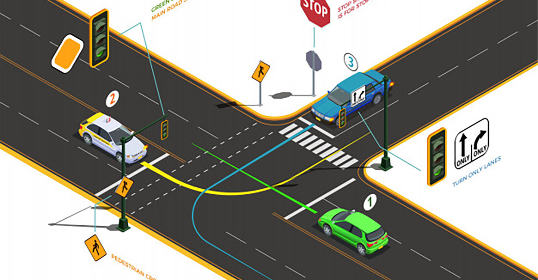
Our Clients' Feedback


















.jpg)
.jpg)
![Artificial Intelligence in Education [Ultimate Knowledge Hub]](/uploads/images/blog/posts/previews/image_163177848252-image(600x250-crop).jpg)
.jpg)
.jpg)

.jpg)
.jpg)
.jpg)
.jpg)
![How to Create a Language Learning App [The Ultimate Guide!]](/uploads/images/blog/posts/previews/image_155352483594-image(600x250-crop).png)
.jpg)
.jpg)
.jpg)
.jpg)
![Integrate Your CRM with LMS to Increase Sales [Start now!]](/uploads/images/blog/posts/previews/image_162030700147-image(600x250-crop).jpg)
.jpg)
.jpg)
.jpg)
.jpg)
.jpg)
.png)
.jpg)
.jpg)
.jpg)
.png)
.jpg)
.jpg)
.jpg)
.jpg)
.jpg)
.jpg)
.jpg)


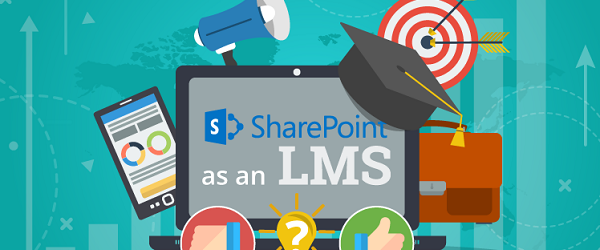
.jpg)
.jpg)
.jpg)
.jpg)
.jpg)
.jpg)
.jpg)
.jpg)
.jpg)
.jpg)
.jpg)
.jpg)
.jpg)
.jpg)
.jpg)
.jpg)
.jpg)
.jpg)
.jpg)
.jpg)
.png)
.png)
.png)

















We have been working for over 10 years and they have become our long-term technology partner. Any software development, programming, or design needs we have had, Belitsoft company has always been able to handle this for us.
Founder from ZensAI (Microsoft)/ formerly Elearningforce